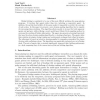Free Online Productivity Tools
i2Speak
i2Symbol
i2OCR
iTex2Img
iWeb2Print
iWeb2Shot
i2Type
iPdf2Split
iPdf2Merge
i2Bopomofo
i2Arabic
i2Style
i2Image
i2PDF
iLatex2Rtf
Sci2ools
125
click to vote
ML
2006
ACM
2006
ACM
Learning to bid in bridge
Bridge bidding is considered to be one of the most difficult problems for game-playing programs. It involves four agents rather than two, including a cooperative agent. In addition, the partial observability of the game makes it impossible to predict the outcome of each action. In this paper we present a new decision-making algorithm that is capable of overcoming these problems. The algorithm allows models to be used for both opponent agents and partners, while utilizing a novel model-based Monte Carlo sampling method to overcome the problem of hidden information. The paper also presents a learning framework that uses the above decision-making algorithm for co-training of partners. The agents refine their selection strategies during training and continuously exchange their refined strategies. The refinement is based on inductive learning applied to examples accumulated for classes of states with conflicting actions. The algorithm was empirically evaluated on a set of bridge deals. The...
Related Content
| Added | 14 Dec 2010 |
| Updated | 14 Dec 2010 |
| Type | Journal |
| Year | 2006 |
| Where | ML |
| Authors | Asaf Amit, Shaul Markovitch |
Comments (0)

